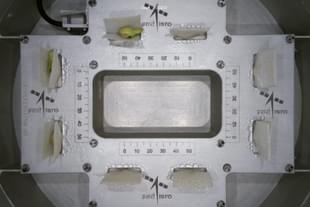News Brief
Microgravity 'Farming': ISRO Sprouts Cowpea Seeds In Space In POEM-4 Experiment
Kuldeep Negi
Jan 04, 2025, 05:54 PM | Updated 05:54 PM IST
Save & read from anywhere!
Bookmark stories for easy access on any device or the Swarajya app.


In a significant development, the Indian Space Research Organisation (ISRO) has successfully germinated cowpea seeds in microgravity environment during the agency's POEM-4 mission.
The experiment utilised the Compact Research Module for Orbital Plant Studies, which has been developed by ISRO's Vikram Sarabhai Space Centre (VSSC).
"VSSC's CROPS (Compact Research Module for Orbital Plant Studies) experiment onboard PSLV-C60 POEM-4 successfully sprouted cowpea seeds in 4 days. Leaves expected soon," ISRO said in a post on X.
The CROPS payload, launched as part of the POEM-4 mission, is envisioned as a multi-phase platform to develop and evolve ISRO’s capabilities for growing and sustaining flora in extraterrestrial environments.
The experiment involves growing eight cowpea seeds in a closed-box environment with active thermal control.
"Passive measurements, including camera imaging, O2 and CO2 concentrations, relative humidity (RH), temperature, and soil moisture monitoring, are available for plant growth and monitoring," ISRO had said in a statement.
Designed as a fully automated system, ISRO has planned a five to seven-day experiment to demonstrate seed germination and plant sustenance until the two-leaf stage in a microgravity environment.
A total of 24 payloads, including CROPS, were launched in the POEM-4 mission, of which 14 payloads are from ISRO/DOS centres and 10 payloads are from various Non-Government Entities (NGEs) comprising Academia and Start-ups that have been received through IN-SPACe.
Also Read: Three Soldiers Killed As Army Vehicle Falls Into Gorge In J&K’s Bandipora
Kuldeep is Senior Editor (Newsroom) at Swarajya. He tweets at @kaydnegi.





